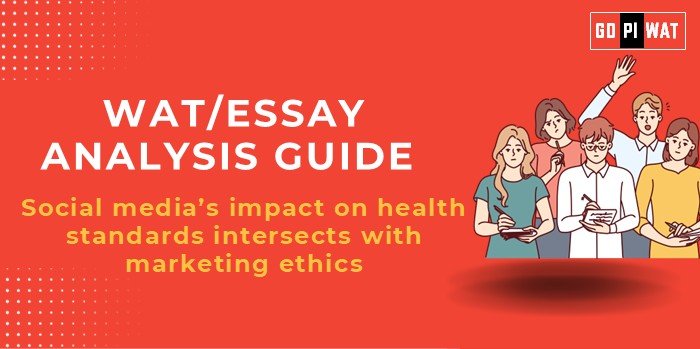📋 Written Ability Test (WAT)/Essay Analysis Guide
🌟 Understanding the Topic’s Importance
Social media’s impact on health standards intersects with marketing ethics, mental health, and digital transformation, making it a relevant essay topic for B-schools. The topic challenges writers to analyze how digital platforms shape societal norms and health behaviors while addressing ethical responsibilities.
🖊️ Effective Planning and Writing
- ⏳ Time Allocation:
- Plan: 5 minutes.
- Write: 20 minutes.
- Review: 5 minutes.
- 📌 Preparation Tips: Identify statistics on body image issues and analyze the stakeholders involved, such as social media platforms, influencers, and mental health advocates.
🎯 Introduction Techniques for Essays
- Contrast Introduction: “While social media democratizes health information, its idealized portrayals often harm mental health.”
- Solution-Based Introduction: “Can stricter regulations on influencers reduce the spread of unrealistic health standards?”
- Timeline Introduction: “The past decade has seen a sharp rise in eating disorders linked to social media, prompting urgent global discussions.”
📂 Structuring the Essay Body
- Achievements: Social media as a tool for awareness campaigns (e.g., #BodyPositivity) and fostering supportive communities.
- Challenges: Misinformation, algorithmic bias favoring idealized content, and the rise in mental health issues among youth.
- Future Outlook: Emphasize the need for regulation, technology-driven solutions like AI moderation, and inclusive campaigns to promote diverse health standards.
✅ Concluding Effectively
- 💡 Balanced Conclusion: “While fostering fitness awareness, social media must prioritize mental health inclusivity for sustainable benefits.”
- 🌍 Global Comparison Conclusion: “Borrowing policies like Norway’s mandatory disclaimers could mitigate the impact of retouched images and promote authenticity.”
✍️ Sample Short Essays
1. Balanced Perspective: “Social media is a double-edged sword, promoting fitness awareness while perpetuating unattainable health ideals. Balancing these outcomes requires collaboration between platforms, governments, and users.”
2. Solution-Oriented: “Introducing AI moderation to flag harmful content could revolutionize the balance between freedom and responsibility on social platforms, promoting a healthier digital environment.”
3. Global Comparison: “Learning from Norway’s ad regulations, global platforms can prioritize realistic portrayals to counteract the rising health crises linked to unrealistic standards.”


